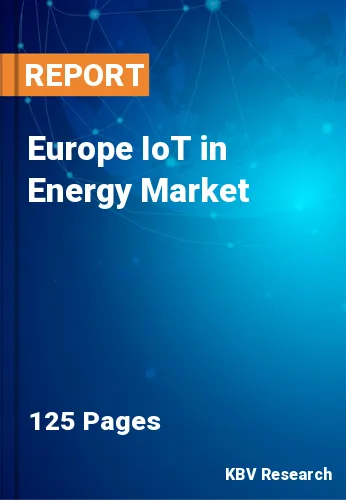Chapter 1. Market Scope & Methodology
1.1 Market Definition
1.2 Objectives
1.3 Market Scope
1.4 Segmentation
1.4.1 Europe IoT in Energy Market, by Application
1.4.2 Europe IoT in Energy Market, by Network Technology
1.4.3 Europe IoT in Energy Market, by Component
1.4.4 Europe IoT in Energy Market, by Organization Size
1.4.5 Europe IoT in Energy Market, by Country
1.5 Methodology for the research
Chapter 2. Market Overview
2.1 Introduction
2.1.1 Overview
2.1.1.1 Market Composition and Scenario
2.2 Key Factors Impacting the Market
2.2.1 Market Drivers
2.2.2 Market Restraints
Chapter 3. Competition Analysis - Global
3.1 KBV Cardinal Matrix
3.2 Recent Industry Wide Strategic Developments
3.2.1 Partnerships, Collaborations and Agreements
3.2.2 Product Launches and Product Expansions
3.2.3 Acquisition and Mergers
3.3 Market Share Analysis, 2021
3.4 Top Winning Strategies
3.4.1 Key Leading Strategies: Percentage Distribution (2018-2022)
3.4.2 Key Strategic Move: (Partnerships, Collaborations & Agreements: 2019, Nov – 2022, May) Leading Players
Chapter 4. Europe IoT in Energy Market by Application
4.1 Europe Oil & Gas Market by Country
4.2 Europe Smart Grid Market by Country
4.3 Europe Coal Mining Market by Country
4.4 Europe Others Market by Country
Chapter 5. Europe IoT in Energy Market by Network Technology
5.1 Europe Radio Network Market by Country
5.2 Europe Cellular Network Market by Country
5.3 Europe Satellite Network Market by Country
Chapter 6. Europe IoT in Energy Market by Component
6.1 Europe Solution Market by Country
6.2 Europe Services Market by Country
Chapter 7. Europe IoT in Energy Market by Organization Size
7.1 Europe Large Enterprises Market by Country
7.2 Europe SMEs Market by Country
Chapter 8. Europe IoT in Energy Market by Country
8.1 Germany IoT in Energy Market
8.1.1 Germany IoT in Energy Market by Application
8.1.2 Germany IoT in Energy Market by Network Technology
8.1.3 Germany IoT in Energy Market by Component
8.1.4 Germany IoT in Energy Market by Organization Size
8.2 UK IoT in Energy Market
8.2.1 UK IoT in Energy Market by Application
8.2.2 UK IoT in Energy Market by Network Technology
8.2.3 UK IoT in Energy Market by Component
8.2.4 UK IoT in Energy Market by Organization Size
8.3 France IoT in Energy Market
8.3.1 France IoT in Energy Market by Application
8.3.2 France IoT in Energy Market by Network Technology
8.3.3 France IoT in Energy Market by Component
8.3.4 France IoT in Energy Market by Organization Size
8.4 Russia IoT in Energy Market
8.4.1 Russia IoT in Energy Market by Application
8.4.2 Russia IoT in Energy Market by Network Technology
8.4.3 Russia IoT in Energy Market by Component
8.4.4 Russia IoT in Energy Market by Organization Size
8.5 Spain IoT in Energy Market
8.5.1 Spain IoT in Energy Market by Application
8.5.2 Spain IoT in Energy Market by Network Technology
8.5.3 Spain IoT in Energy Market by Component
8.5.4 Spain IoT in Energy Market by Organization Size
8.6 Italy IoT in Energy Market
8.6.1 Italy IoT in Energy Market by Application
8.6.2 Italy IoT in Energy Market by Network Technology
8.6.3 Italy IoT in Energy Market by Component
8.6.4 Italy IoT in Energy Market by Organization Size
8.7 Rest of Europe IoT in Energy Market
8.7.1 Rest of Europe IoT in Energy Market by Application
8.7.2 Rest of Europe IoT in Energy Market by Network Technology
8.7.3 Rest of Europe IoT in Energy Market by Component
8.7.4 Rest of Europe IoT in Energy Market by Organization Size
Chapter 9. Company Profiles
9.1 Accenture PLC
9.1.1 Company Overview
9.1.2 Financial Analysis
9.1.3 Regional Analysis
9.1.4 Research & Development Expense
9.1.5 Recent strategies and developments:
9.1.5.1 Partnerships, Collaborations, and Agreements:
9.1.5.2 Product Launches and Product Expansions:
9.1.5.3 Acquisition and Mergers:
9.1.6 SWOT Analysis
9.2 IBM Corporation
9.2.1 Company Overview
9.2.2 Financial Analysis
9.2.3 Regional & Segmental Analysis
9.2.4 Research & Development Expenses
9.2.5 Recent strategies and developments:
9.2.5.1 Partnerships, Collaborations, and Agreements:
9.2.5.2 Product Launches and Product Expansions:
9.2.6 SWOT Analysis
9.3 Cisco Systems, Inc.
9.3.1 Company Overview
9.3.2 Financial Analysis
9.3.3 Regional Analysis
9.3.4 Research & Development Expense
9.3.5 SWOT Analysis
9.4 Hewlett Packard Enterprise Company
9.4.1 Company Overview
9.4.2 Financial Analysis
9.4.3 Segmental and Regional Analysis
9.4.4 Research & Development Expense
9.4.5 SWOT Analysis
9.5 Intel Corporation
9.5.1 Company Overview
9.5.2 Financial Analysis
9.5.3 Segmental and Regional Analysis
9.5.4 Research & Development Expenses
9.5.5 Recent strategies and developments:
9.5.5.1 Partnerships, Collaborations, and Agreements:
9.5.6 SWOT Analysis
9.6 SAP SE
9.6.1 Company Overview
9.6.2 Financial Analysis
9.6.3 Segmental and Regional Analysis
9.6.4 Research & Development Expense
9.6.5 SWOT Analysis
9.7 Schneider Electric SE
9.7.1 Company Overview
9.7.2 Financial Analysis
9.7.3 Segmental and Regional Analysis
9.7.4 Research & Development Expense
9.7.5 Recent strategies and developments:
9.7.5.1 Partnerships, Collaborations, and Agreements:
9.7.5.2 Product Launches and Product Expansions:
9.7.6 SWOT Analysis
9.8 Robert Bosch GmbH
9.8.1 Company Overview
9.8.2 Financial Analysis
9.8.3 Segmental and Regional Analysis
9.8.4 Research & Development Expense
9.8.5 Recent strategies and developments:
9.8.5.1 Product Launches and Product Expansions:
9.8.6 SWOT Analysis
9.9 Google LLC
9.9.1 Company Overview
9.9.2 Financial Analysis
9.9.3 Segmental and Regional Analysis
9.9.4 Research & Development Expense
9.9.5 Recent strategies and developments:
9.9.5.1 Partnerships, Collaborations, and Agreements:
9.9.6 SWOT Analysis
9.10. HCL Technologies Ltd. (HCL Enterprises)
9.10.1 Company Overview
9.10.2 Financial Analysis
9.10.3 Segmental and Regional Analysis
9.10.4 Research & Development Expense
9.10.5 Recent strategies and developments:
9.10.5.1 Partnerships, Collaborations, and Agreements:
9.10.5.2 Product Launches and Product Expansions:

